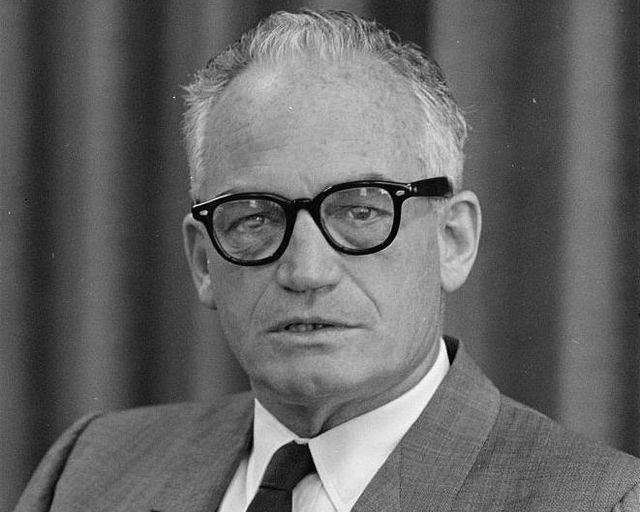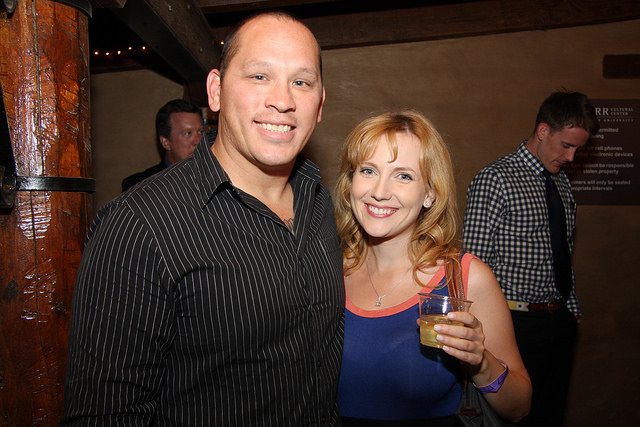
Between U.S. Senator Rand Paul being taken seriously as a presidential candidate and broad support for the legalization of marijuana, the country is “having a libertarian moment,” 12 News Sunday Square Off host Brahm Resnik told a crowd at the Arizona State University Kerr Cultural Center in Scottsdale. “Is this a moment Barry Goldwater helped to create?”
Resnik was moderating a panel co-presented by ASU on the legacy of the late Arizona senator.
“I don’t think there’s any question about that,” said Arizona Republic columnist Robert Robb. “Both the historically important Barry Goldwater”—who wrote the book Conscience of a Conservative, ran for president in 1964, and helped establish the libertarian viewpoint on economics, limited government, and federalism—as well as the later Barry Goldwater, who reacted against the religious right, helped shape the current moment.
Rand Paul is the real heir of Goldwater in Washington today, said Slate political reporter Dave Weigel, adding that Paul’s “liberal-utopian” view of the world is more popular than ever before. Said Weigel: Paul believes, as Goldwater believed, that if you give people freedom, they’ll create a better, fairer society without government.
Although Goldwater’s views may be popular on different parts of the political spectrum, if Goldwater walked the halls of the Capitol today, “he’d be disappointed,” said ASU historian Michael Rubinoff. The collegiality Goldwater knew when he entered the Senate in 1953 is long gone. And Goldwater himself was shattered by the nastiness of the reaction to his 1964 presidential campaign.
Goldwater, said Resnik, has become almost this “cuddly hero” to contemporary liberals, who like the stands he took on abortion and gay rights. How accurate is this perception?
Goldwater entered politics as a “hard-right, libertarian conservative” and “an insurgent,” said Robb. He advocated eliminating federal rule over agriculture, education, and social welfare programs. But he later became an establishment Republican. In 1976, he endorsed Gerald Ford over Ronald Reagan for president; in 1980, Goldwater ran for re-election to the U.S. Senate as a pro-life candidate. It was only after the rise of social conservatives later in the 1980s that Goldwater developed an antagonism toward the religious right. The more recent liberal embrace of Goldwater is emblematic of how “American people over time develop an affection for those iconic characters,” said Robb.
What, asked the moderator Resnik, would Goldwater have made of drones and the national security state?
That’s difficult to discern, said Robb. The “natural libertarian position is non-interventionism.” But Goldwater and libertarians in postwar America saw the Soviet Union as a more serious threat; they supported “a liberation approach,” believing that the U.S. should actively undermine and liberate captive nations, especially in Eastern Europe. Given this history, said Robb, Goldwater probably “would have countenanced fairly aggressive surveillance, including internally.”
Resnik asked Rubinoff how Goldwater transformed Arizona’s Republican party.
Goldwater first ran for office in a very different Arizona, said Rubinoff: The state’s population was small, and Goldwater was already well-known because he’d made a film about camping in the Grand Canyon that he’d shown all across Arizona. Goldwater was elected to Phoenix’s city council after returning from World War II, and he was instrumental in remaking the city charter. Phoenix’s politics had been corrupt; Goldwater made the city more efficient, building a “lean and mean government” with low taxes that created a more favorable business climate. In turn, he remade the state’s Republican party in his own image, with “little Goldwaters” elected in his wake.
Resnik said that he’d recently read Goldwater’s Conscience of a Conservative and was surprised to find that, if you ripped off the cover and didn’t know the date of publication or the author, it read like a Tea Party manifesto. Is the Tea Party the true heir of Goldwater? Weigel’s answer: A lot of what the Tea Party rejects—Medicare, Medicaid, social programs, big government as we know it today—didn’t exist when Goldwater wrote his book.
Put Barry Goldwater in Arizona in 2010, proposed Resnik. Where would he have come down on the state’s strict anti-illegal immigration bill, SB 1070?
Robb noted that the immigration issue didn’t develop until the 1990s and 2000s, and there was bipartisan support for the 1986 immigration reform bill. But while Robb didn’t want to project, he allowed that Goldwater would “be on the side of Arizona as a welcoming place,” one that embraces its Latino heritage. However, he said that he didn’t think Goldwater would be indifferent to the effects of illegal immigration on local governments—and he would have argued against the notion that immigration is exclusively a federal issue.
Before turning to the audience for the question-and-answer session, Resnik asked whether Rand Paul has a chance to win if he decides to run for president in 2016.
Robb said that it’s an election cycle or two too early for Paul to be able to win. By 2020 and 2024, the financing of the modern welfare state will be so costly that it can’t be ignored, perhaps giving Paul an opening.
Weigel said that while he doesn’t feel confident Paul himself can win the presidency, he does think that Paul’s ideas are going to win.
And, said Rubinoff, Paul will be propelled by the same force that propelled Goldwater: the idealism of younger people who don’t have the patience for the Republican establishment.
Audience members continued the “what would Barry Goldwater think” game, with questions about an Arizona religious rights bill, terrorism and surveillance, and the role of corporations in our lives and our government.
When it comes to corporations and campaign finance, Robb said that in Conscience of a Conservative, Goldwater inveighed against unions and corporations donating and participating in political campaigns. But this may have been a strategy “to make his anti-union screed more broadly palatable,” said Robb, noting that Goldwater was very comfortable with large businesses and an icon of the Arizona business community.






Send A Letter To the Editors